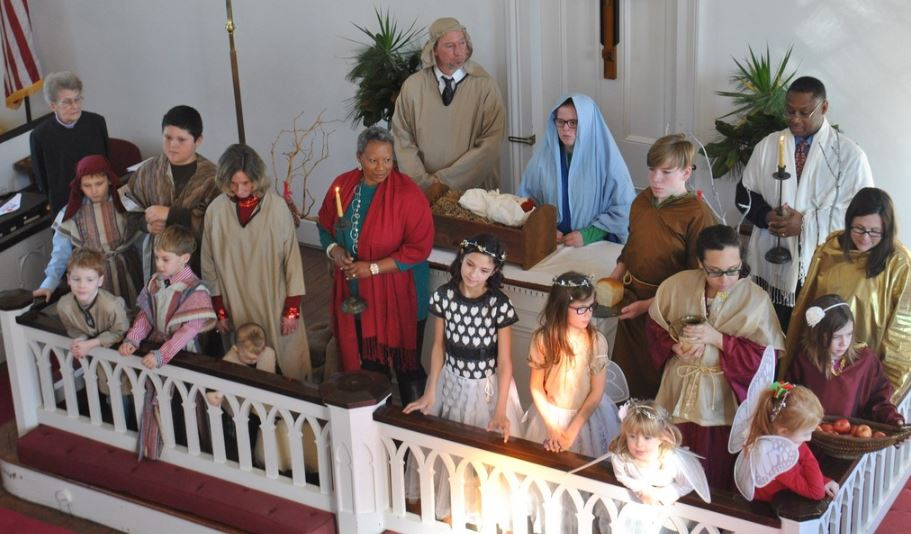1. 4 Part Christmas medley – Larry Saylor
2. Lighting of the 2nd Advent Candle
3. Youth readers
4. Homily
5. Christmas play – Streamed Note: You may need to turn the volume up
6. Christmas play – Filmed
6. Christmas play – Filmed 2
St. Peter's Episcopal Church, Port Royal, VA

We are a small Episcopal Church on the banks of the Rappahannock in Port Royal, Virginia. We acknowledge that we gather on the traditional land of the first people of Port Royal, the Nandtaughtacund, and we respect and honor with gratitude the land itself, the legacy of the ancestors, and the life of the Rappahannock Tribe. Our mission statement is to do God’s Will in all that we do.
1. 4 Part Christmas medley – Larry Saylor
2. Lighting of the 2nd Advent Candle
3. Youth readers
4. Homily
5. Christmas play – Streamed Note: You may need to turn the volume up
6. Christmas play – Filmed
6. Christmas play – Filmed 2


Explore Advent, Part 2
“Advent is a time to look for “desert places”: the place of solitude, the place of true silence in which we can become fully awake to our sin and God’s forgiving grace which alone can heal it.”-Br. Robert L’Esperance
This week we focus on John the Baptist through scripture, art and commentary. Let’s move to Advent 2.


St Nicholas Day is December 6.
Here is a presentation that provides the background of this saint who has had a colorful and varied history over 1800 years.

A collection around the following 6 categories:
![]()
 READ!
READ!
1 What Does This Season Mean? Though Advent appears at the end of the secular calendar year, it is the beginning of the Christian year. The deep darkness of the natural world around us is an echo of the nurturing darkness of the dawning of Creation. It is in this holy space we begin re-telling our Sacred Stories. The word “Advent” comes from the Latin adventus, which means “coming” or “arrival.” Advent prepares us for, and leads us to, Jesus’ birth in Bethlehem. The four Sundays in Advent invite us on a journey. As the days grow shorter each week, we are invited to draw closer and closer to the light of Christ. We are invited to open our hearts a little wider each week to God With Us.
2 Three Teaching Points of Advent – Sarah Bentley Allred https://bit.ly/2HMHfA2
3 The way we begin Advent is different. Each year, the First Sunday of Advent starts the church’s liturgical calendar, and our countdown to Christmas, with a set of haunting, apocalyptic readings https://buildfaith.org/apocalyptic-advent-in-the-season-of-merry-and-bright/
4 Advent Waiting Article explores three qualities of Advent waiting – expectant, requires us to make space, and is hopeful.
5 Waiting and Unknowing by Fr. Richard Rohr. Once Thanksgiving is over, we in the United States are rushed headlong into the Christmas season. Yet Advent was once (and still can be) a time of waiting, a time of hoping without knowing, a time of emptying so that we can be filled by the divine Presence.
6 Advent as an introvert Season – Advent is expectant and full of hope. “There’s also a solemn quality to the waiting — not dour or dreary — something grounded and okay with a close stillness, a quality that honors the waiting itself as sacred.” https://onbeing.org/blog/the-shoulder-season-of-advent/
7 Advent mediations from Living Compass. Read it here
The key word is “simplicity”. “We are talking about a practice of simplicity on a much deeper level. This is the kind of simplicity that people talk about when they describe being in the midst of a crisis, and then later report that the crisis has caused them to rethink their priorities, to focus on what is truly most essential in their lives.”
“So let us embrace whole-heartedly the season of Advent, along with these reflections, as the support we need to practice simplicity in a way that will help prepare us for the true meaning of Christmas.”
“The Living Compass Model for Well-Being offers us guidance in four dimensions of our being: heart, soul, strength, and mind. Our call is to live an undivided life, where heart, soul, strength, and mind are integrated into both our being and our doing.” Quotes begin on Page 44
 WATCH
WATCH
1 Nativity: The Art and Spirit of the Creche. After the cross, the Nativity scene is Christianity’s most recognized symbol. Its history, art and spirituality have been embraced by cultures around the world for nearly two thousand years. This video unites theologians and collectors with an astonishing and beautiful array of nativity scenes collected from across the globe. https://www.youtube.com/embed/M29ShR-V9Pk
2 The Story of Silent Night – Classic Collection In the quiet of an Austrian winter, a young priest received heavenly inspiration to commemorate the most significant event in history by writing the world’s most beloved Christmas carol, “Silent Night.” https://youtu.be/nKn9wLLzha8
 LEARN!
LEARN!
1 Luke’s canticles – Combines four stories from Luke with insights from artists, prayers, and hymns from around the world. Based on Songs in Waiting by Paul Chandler, now the Bishop of Wyoming https://www.churchsp.org/course/lukescanticles/
2 Matthew’s Infancy Stories. The other author of the infancy stories, much different than Luke above https://www.churchsp.org/course/matthewsinfancystories/”
3 Christmas Carols – They surround us at Christmas. How much do you know about them?https://www.churchsp.org/course/12daysofcarols/
4 Handel’s Messiah, Prophesy and Birth of the Messiah. The premiere Christmas work with the music and text https://www.churchsp.org/course/handels-messiah-part-1-prophecy-and-birth-of-the-messiah/
5. Dickens A Christmas Carol and the Bible. The premiere Christmas novel, here with the influence of the Bible and much of Dickens time https://www.churchsp.org/course/dickens/
 LISTEN!
LISTEN!
1 O Emmanuel A fresh exploration of the O Antiphons including traditional Advent and Christmas music. The album combines a jazz trio with children’s choir and adult voices in just the right mix of expectation and joy. https://music.apple.com/us/album/o-emmanuel/1151565367
2 Advent Lessons and Carols – Washington National Cathedral The classic way to begin Advent – Scripture and music with a service for the season. Previous service https://www.youtube.com/watch?v=wwR1FJ3-dts&t=3s , Nov. 27, 2022 service, 4pm https://cathedral.org/event/advent-lessons-and-carols-4/
3. Still Forming Advent Meditations by Christianne Squires is a collection of audio meditations recorded by Christianne Squires for the Still Forming community, based on Jan Richardson’s book of blessings, Circle of Grace https://www.stillforming.com/still-forming-advent-meditations-2015
4 Spotify Play list Advent with Sacred Ordinary Days on Spotify. Listen and prepare for our Savior, with anticipation, longing and hope
 PRAY AND REFLECT!
PRAY AND REFLECT!
1 Advent meditations. In this workshop, Rev. Hillary Raining, D.Min. guides you through a meditation with prayer, scripture, and reflection using visio Divina, or “divine seeing,” with candlelight. http://lifelonglearningvts.teachable.com/p/advent-meditation-workshop/?src=email
2 Antiphons for Advent in English and Spanish for 2022 A devotional resource in English and Spanish created from antiphons that families and communities can use daily in Advent. The short liturgy includes a prayer for lighting candles of an Advent wreath.
An antiphon is the brief snippet of a psalm recited or chanted as a refrain at the beginning and/or end of a psalm or canticle. Antiphons were in use by the 5th century and are still in use during the services of daily prayer. The practice comes from the Jewish tradition of the congregation reciting, chanting, or singing together, the word referring to call-and-response type of singing. https://buildfaith.org/wp-content/uploads/2022/10/Advent-Antiphons.ENG_.2022.pdf
3 Journey on the Way of love. Designed for Christian Formation (“Sunday School”). There are 4 sessions for the 4 weeks of Advent The Way of Love is based on a rule of life. The best known rule of life developed in Christian monastic communities is that of St Benedict, dating from the 6th century. https://www.episcopalchurch.org/journeying-way-love/
 MAKE!
MAKE!
3 Families celebrate Advent and Christmas Families Celebrate Advent & Christmas is a colorful deck of cards that is full of rituals, prayers and reflections. Endlessly flexible for busy schedules, you can create a new after-meal ritual, use them as decorations, or carry them on the go. https://www.augsburgfortress.org/store/product/9781506483498/Families-Celebrate-Advent-and-Christmas-2022-23 Free promo pack at bottom!
4 Create your own advent calendar 20 advent calendars to make. https://www.parents.com/holiday/christmas/crafts/best-advent-calendars/.
5 Advent wreaths on a Budget In congregations that have tight budgets, making Advent wreaths with families may be out of reach. While making wreaths is a wonderful parish life event, buying the foam inserts, ring trays, five candles and four stakes can add up to a hefty sum. Here is an alternative solution https://buildfaith.org/99-cent-advent-wreath/
Here is another wreath article from Episcopal Relief that go up to $50 in cost.
Advent is a season of Watching and Waiting. It is a season of leaning into hope
Lord Jesus: Come into our world and heal its wounds Come into your church and raise it up Come into our homes and make them holy Come into our work and make it fruitful Come into our minds and give us clarity Come into our lives and make them beautiful O Come, O Come Emmanuel
God of the past, the present and the future, grant me patience when I must wait, courage when it’s time to take action, and the wisdom to know when to wait and when to act. Amen.
Click here to view in a new window.

St. Peter’s Christmas play has been different from the typical Children’s Church play. It will be held on 2nd Advent this year, Dec. 3, 2022
First it has involved parishioners of all ages and not just children. Second it takes up most of the Sunday service. Lastly the play is written fresh every year. No repeats. The tradition began in the 1990’s under the Rev. Karen Woodruff when there were many children in the parish.
Here is a collection of Christmas pageants from 2010.
This year St Nicholas will visit the 11AM service and the St Peter’s youth will take the lead in playing holiday music for the congregation.